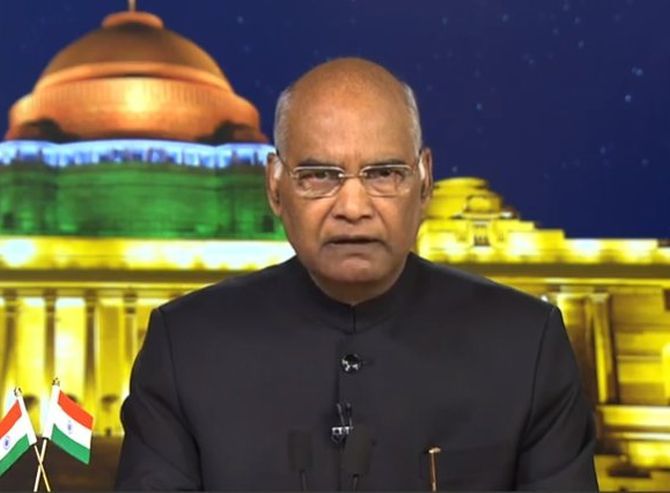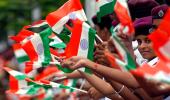Here's the full text of President Ram Nath Kovind's address on the eve of 70th Republic Day of India.

Dear Fellow Citizens
My greetings to all of you on the eve of our 70th Republic Day! This is an occasion to commemorate the values of our democracy and Republic. This is an occasion to reaffirm our commitment to liberty, fraternity and equality across our society and among all our citizens. And above all, this is an occasion to celebrate India and the spirit of being Indian.
Every Republic Day is precious and every day in the life of our Republic is precious. Yet this year is a little extra special. On October 2, we will mark the 150th birthday of Mahatma Gandhi, who led us -- and who inspired oppressed societies in Asia, Africa and elsewhere -- to freedom from colonial rule. Gandhi ji remains the moral compass of our Republic; his teachings are still the touchstone to measure our policies and initiatives. His 150th anniversary is not for India alone; it is a joy to be shared with the world.
A few weeks after Gandhiji’s birthday, on November 26, we will mark the 70th anniversary of the adoption of our Constitution. This enlightened and far-reaching document laid the foundations of our Republic. It was the work of men and women of principle and patriotism – the members of the Constituent Assembly. In particular, we recall the role of Babasaheb Dr Bhimrao Ambedkar, who chaired the Drafting Committee. In his honour, and in our Constitution’s honour, the nation will celebrate Constitution Day this year in an appropriate manner.
The values that shaped Indian independence and that continue to shape our Republic – the values inculcated in our democracy and our Constitution – are also the values that uphold the supremacy of the people of India.
This year, the people of India -- each one of us -- have another responsibility: of voting in the general election and electing the 17th Lok Sabha.
The ideas and idealism of our democracy will come into full force. Once more, as we do every five years, voters will deliver their verdict and write their destiny. This year’s election will be the first when voters born in the 21st century will contribute to electing a new Lok Sabha.
An election is not just a political exercise. An election is a collective call to wisdom and a collective call to action. It represents a renewal and a recommitment to the goals and hopes of a shared and egalitarian society.
It represents the diverse and yet singular urges of the people and the Republic of India. This makes the very act of voting a sacred act. Please perform this act. Who the voter chooses to vote for is up to him or her, I would only request all eligible voters to go out and vote. Our country is at a key juncture.
In some respects this is as critical and formative a period as the late 1940s and early 1950s. Decisions and actions of today will shape the India of the remainder of the 21st century. As such, this is not just a once-in-a-generation moment -- it is a once-in-a-century moment.
Having said that, let us remember that this election is only a milestone in the journey towards fulfilling the aspirations of our people and building a developed India. India is at the doorstep of eliminating extreme poverty for the first time in memory.
A programme of universal and equitable healthcare has begun to be rolled out. Affordable medicines and medical devices and implants are becoming a reality for more and more sections of our people. A greater number of Indians than ever previously have access to proper housing, with modern sanitation and electricity.
Connectivity -- in the form of ports and inland waterways, upgraded railways and new metro services, national highways and rural roads, cost-effective air services to the interiors of India, and of course the surge in mobile phones and data access -- is bringing us together as never before. India has been united and integrated -- now it is being networked.
Leapfrogging technologies and leapfrogging enlightenment are empowering our farmers and equipping our soldiers. They are enabling our traditionally deprived fellow citizens and educating our daughters and our sons.

They are exciting the entrepreneurial energies and the infectious start-up culture that has made our younger generation and our India the focus of world attention and admiration.
Fellow Citizens
In my travels across the country and my engagements with all sections of our society, I have sensed appreciation for such efforts and such hard-won advance. This is more so in the perception of senior generations that have lived through and strived to overcome the shortage economy.
In area after area, commodity after commodity, we have converted difficulty into availability. We have done this step-by-step and year-by-year. And yet whether in food grains or LPG cylinders, telephone connections or even the ability to get a passport, change is apparent and change is visible.
In many cases, technology has been a force multiplier. And in all cases, inclusiveness has been a moral multiplier.
No conception of India’s development can be complete without a salute to our spirit of inclusiveness -- of access and opportunity for all; of an expansion and an embrace of those whom we consider our own.
This country belongs to each of us and to all of us -- every group and every community, every region and every identity. It belongs to every citizen and every individual.
India's pluralism is its greatest strength and its greatest example to the world. The 'Indian model' rests on a tripod of diversity, democracy and development. We cannot choose one above the other; we must have all three and we will have all three.
The best indicator of social change in India is change towards gender equity and towards providing equal opportunities, under conditions of equality, to every girl child and every woman. In my experience, when given the chance, our daughters tend to not just equal but outperform our sons in the classroom.
Young women in our country are moving ahead in every field -- from academics to the creative arts, from sports to the armed forces. There is no stopping and no hesitation in this process. It is the route to India’s future.
Fellow Citizens
Our Republic has come a long way and we must appreciate how far successive generations have brought us. Equally, we must appreciate that our voyage is far from complete. There are still waters to cover, still gaps to fill and still tears to wipe.
We have to recalibrate our yardstick of achievement and success -- from quantity to quality; from a literate society to a knowledge society; from a nation that has room for all segments and all communities to a family that invokes, encourages and celebrates the uniqueness and potential in each person -- each daughter and each son.
In his book 'India of My Dreams', Mahatma Gandhi wrote of an India where the poorest will have an 'effective voice', where there will be no 'high class and low class', where 'all communities shall live in perfect harmony', and where 'women will enjoy the same rights as men'.
These ideals are a constant reminder of the India that we are building. In this context, the recent constitutional amendment to provide special facilities for talented children from poorer families is another step to an India of our dreams -- and of Gandhi ji's dreams.
The human experience is built on partnerships. Partnerships at home build a family. Partnerships at work build a business. Partnerships of different stakeholders build society. Partnerships of the government and the people build our nation.
And partnerships of nations build a better world. In this manner partnerships are the thread knitting together family, nation and world -- and leading to the treatment of the World as a Family: Vasudhaiva Kutumbakam.
Partnerships are enhanced by open communication, honest conversation and unstinted compassion. This is true with members of our families. This is also true with sections or groups that have been historically disadvantaged and whose grievances must continue to be heard and addressed.
It is important to create avenues for such conversations, even if they are inconvenient.
In a society experiencing rapid change, we must be prepared for such conversations. And similarly we must be alive to the need for compassion -- to those less privileged than us and to the differently-abled, for example.
Our society has shown great regard for those, whether individuals or institutions, who devote themselves to people’s welfare and go beyond the call of duty.
The concept of seva, of devotion to public service and to the broadening of the ambit of justice, must get its due. Well-intentioned contributions of individuals, of groups of people, of institutions, whether public or private, of society at large, or for that matter of the government, must be acknowledged and appreciated.
These are guiding principles for us at home as well as abroad. These are guiding principles that shape India’s global approach -- whether in peace-keeping, climate change mitigation, development partnerships, or humanitarian assistance and disaster relief. These are earning India a new respect in the international system.
These are the principles, I would stress, that are at the root of our Republic. Our Republic’s vision is that of reaching democratic goals by democratic means, pluralistic goals by pluralistic means, enlightened goals by enlightened means, inclusive goals by inclusive means, compassionate goals by compassionate means -- and constitutional goals by constitutional means.
May those principles always illuminate our path! After all, 'We, the People …' gave ourselves this Constitution and 'We, the People …' are the custodians and upholders of its principles.
With those words, I once again wish all of you a happy Republic Day.
Jai Hind!











 © 2025
© 2025